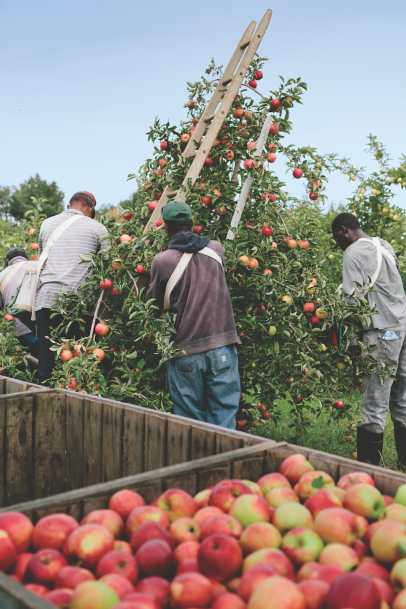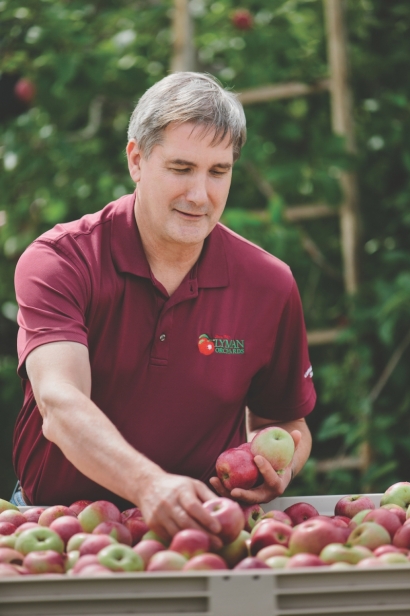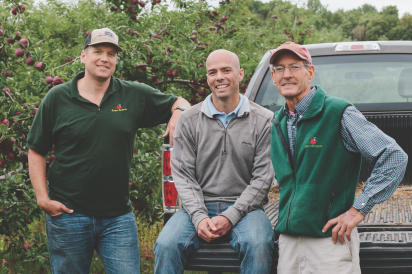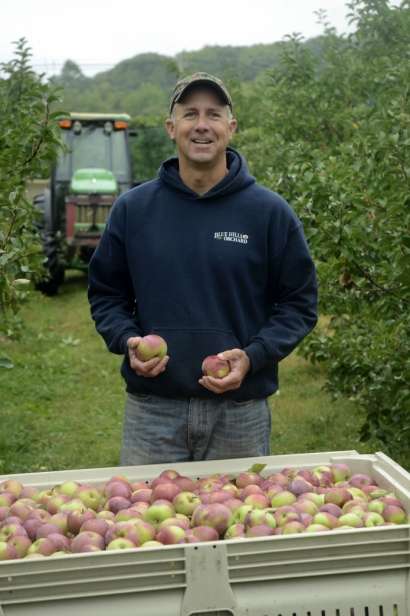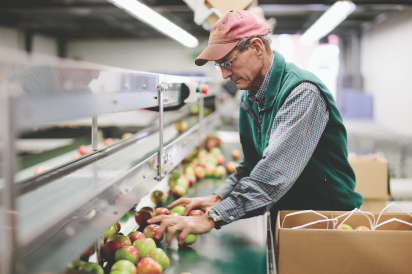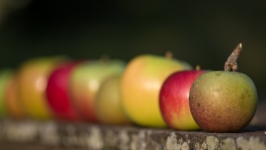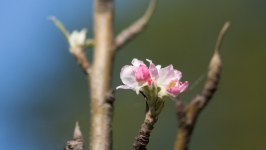The EcoApple Certification Program
Summer’s peach season may still be fresh in our memories, but the crisp nights and quickly-turning trees remind us that our state’s orchards have a second act in store: apple season. Apples have been a Connecticut staple for centuries, and our state boasts a bounty of orchards that grow them. Three of these orchards - all within 20 miles of each other, just northwest of New Haven: Lyman Orchards, Rogers Orchards, and Blue Hills Orchard - have quickly found themselves among our nation's leaders in ecological growing practices.
The EcoApple
All three orchards are part of the EcoApple® and EcoPeach™ program, a third-party certification program and partnership between growers, scientists, and Massachusetts-based food hub Red Tomato, that supports fruit growers in the northeast in using the most eco-sensitive, minimally invasive growing methodologies possible. Based on agricultural practices designed to create an orchard ecosystem that supports pollinators and keeps damaging insects in balance with natural predators, and supported by marketing and coordination of supply, the program is both a resource for farmers and a benefit to consumers interested in purchasing sustainably grown fruit.
Lyman Orchards is the 12th oldest family run business in the United States. Founded in 1741, the orchard has been continuously run by the Lyman family. After learning progressive growing techniques in Holland, John Lyman returned to the United States to manage the family farm, expanding it to include baked goods and additional varieties of apples. Michael Rozyne, Red Tomato’s founder, first met John Lyman in 2003 over a shared love of ripe peaches. John was concerned about how fruit growers in the northeast could tell the story of care, stewardship, and what advanced integrated pest management (IPM) looks like on an orchard, and they began developing the Eco program with five additional orchards. With twice as many pests and diseases as growers in the western U.S. contend with, fruit growers in the northeast have to employ a wide variety of tools to deliver a fresh, delicious, and aesthetically appealing crop to market. Focusing on biological controls (such as disrupting pests’ mating habits and introducing insects that are beneficial to the crop) and healthy orchard management requires both extra vigilance and greater risk of crop loss than modern fruit farming practices, but the Eco program’s resources help farmers mitigate some of the latter.
Since its founding, the EcoApple program has grown to include 16 orchards throughout the northeast. Lyman, Blue Hills, and Rogers Orchards grow both apples and peaches under the rigorous growing protocol. The non-profit IPM Institute of North America manages the annual orchard certification, and this year conducted an analysis of records for orchards that have participated in the program consistently over the past ten years. The analysis was conducted using the Pesticide Risk Tool (PRT), an online tool that ranks pesticide products for impacts on the environment (including birds, earthworms, and mammals), worker/bystander health, consumer health risks, and pollinators. The PRT is run by the IPM Institute of North America and was developed with support from the USDA and Oregon State University.
The results indicate that use of high-risk chemicals among Eco certified orchards has decreased 59% since 2004, the year before the program began, and has continued to drop 18% since 2010. “The pressure from pests and disease in an orchard can vary from year-to-year due to weather and other conditions, but the goal of the Eco program is to steadily reduce overall risk over time. We are encouraged to see the data indicate that is happening,” says Dr. Thomas Green, entomologist and President of the IPM Institute.
It Takes A Village
Fly speck (a discoloration of an apple’s skin caused by a fungal growth), the brown marmorated stink bug, and unseasonal summer hail aren’t usually what we think about when picking apples. However, for John Lyman, Eric Henry (of Blue Hills Orchard), and John Rogers (of Rogers Orchards), managing agricultural challenges that range from pests to inclement weather runs in their veins, as they and their families have been growing apples for generations. While it’s easy to assume that the three orchards are competitors thanks to their close proximity, the contrary is true. They regularly share information about pests, weather events, and even go so far as to share housing for labor in an effort to reduce costs. According to Michael Rozyne, “these three orchards are our model of grower collaboration. They know each other, share risks and burden, and are committed to growing fruit in the most ecological way possible. The partnership, collaboration, and outstanding fruit are commendable in today’s world of cutthroat business.”
Eric Henry of Blue Hills Orchards, a fifth-generation farmer, carries on his own family’s tradition, growing apples, over 25 varieties of peaches, and other stone fruit including nectarines and plums. Nearby Rogers Orchards, with eight generations of history, has two generations currently involved in managing the farm. “The EcoApple program aligns with our philosophy perfectly. As stewards of the land, we strive to raise a viable and high-quality crop in the most ecologically responsible way,” says Greg Parzych, son-in-law to John Rogers, who along with John’s son Peter and daughter Maria are part of the eighth-generation to manage the orchard.
Fruit from Lyman, Blue Hills, and Rogers Orchards are available in grocery stores throughout the state, and pick-your-own is in full swing. Enjoy apples from these orchards even more, knowing that they are leaders in responsible, progressive growing. Both Rogers (open 10am-5pm Friday, Saturday, and Sunday) and Lyman (open 9am-5pm most days) host pick your own throughout the fall. Blue Hills is open for school tours scheduled in advance and has a farm stand open 10am-6pm on Friday and Saturday, 11am-4pm on Sunday.
- Lyman Orchards: 105 South St., Middlefield; 860-349-1793.
- Rogers Orchards: 336 Long Bottom Rd., Southington; 860-229-4240.
- Blue Hills Orchard: 141 Blue Hills Rd., Wallingford; 203-269-3189.
- Red Tomato: EcoApple Program
- The IPM Institute of North America


